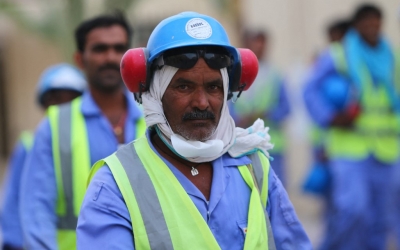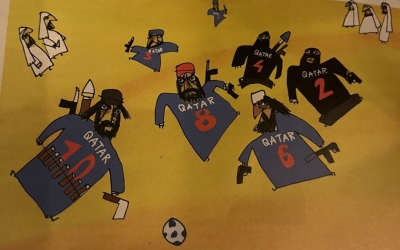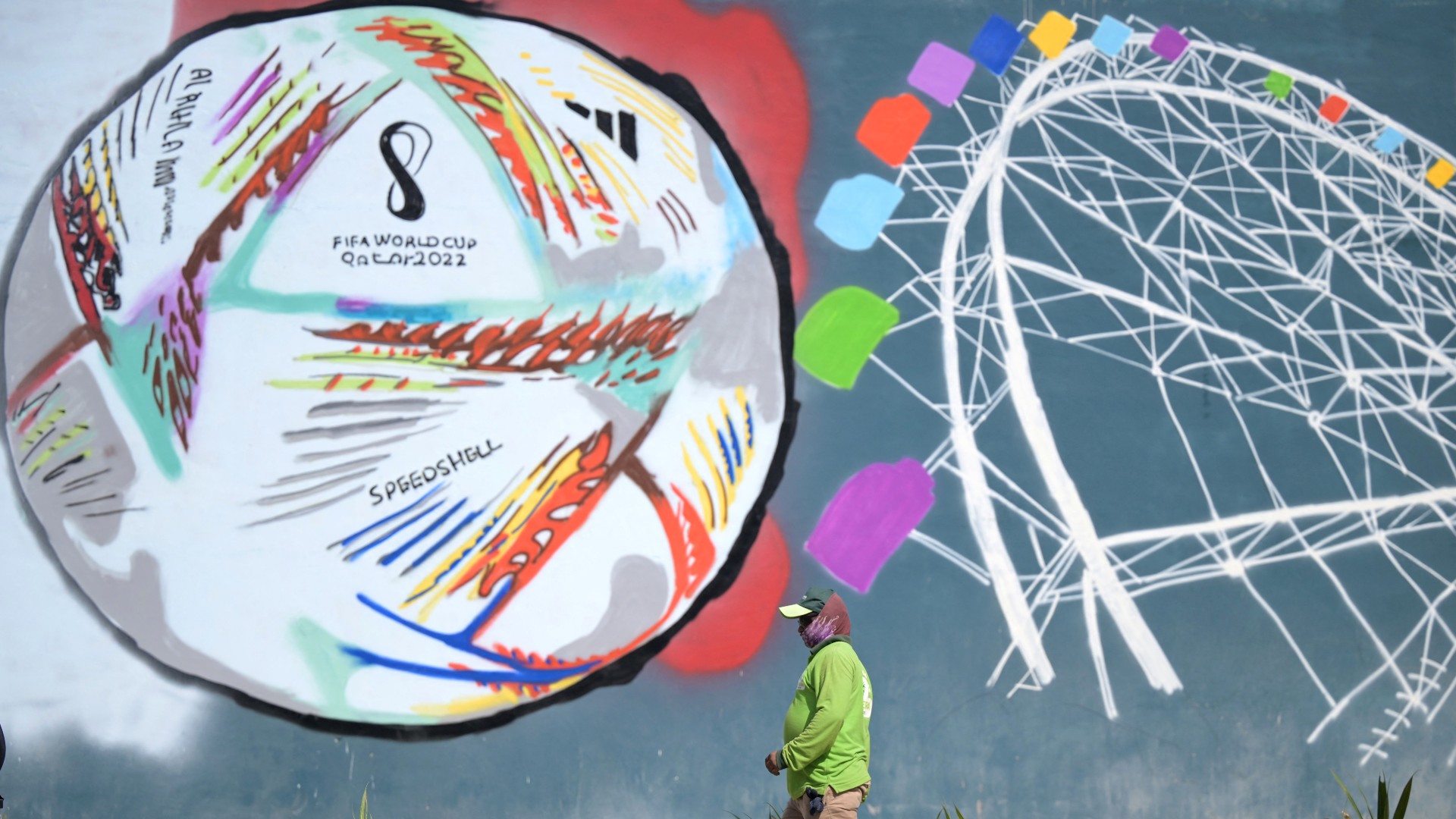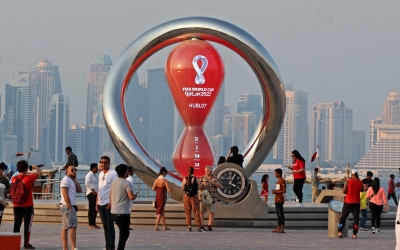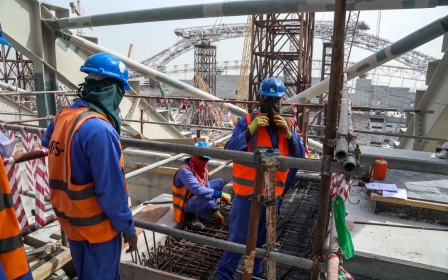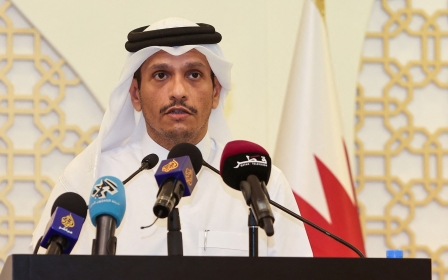World Cup 2022: What's behind the sustained condemnation of Qatar?
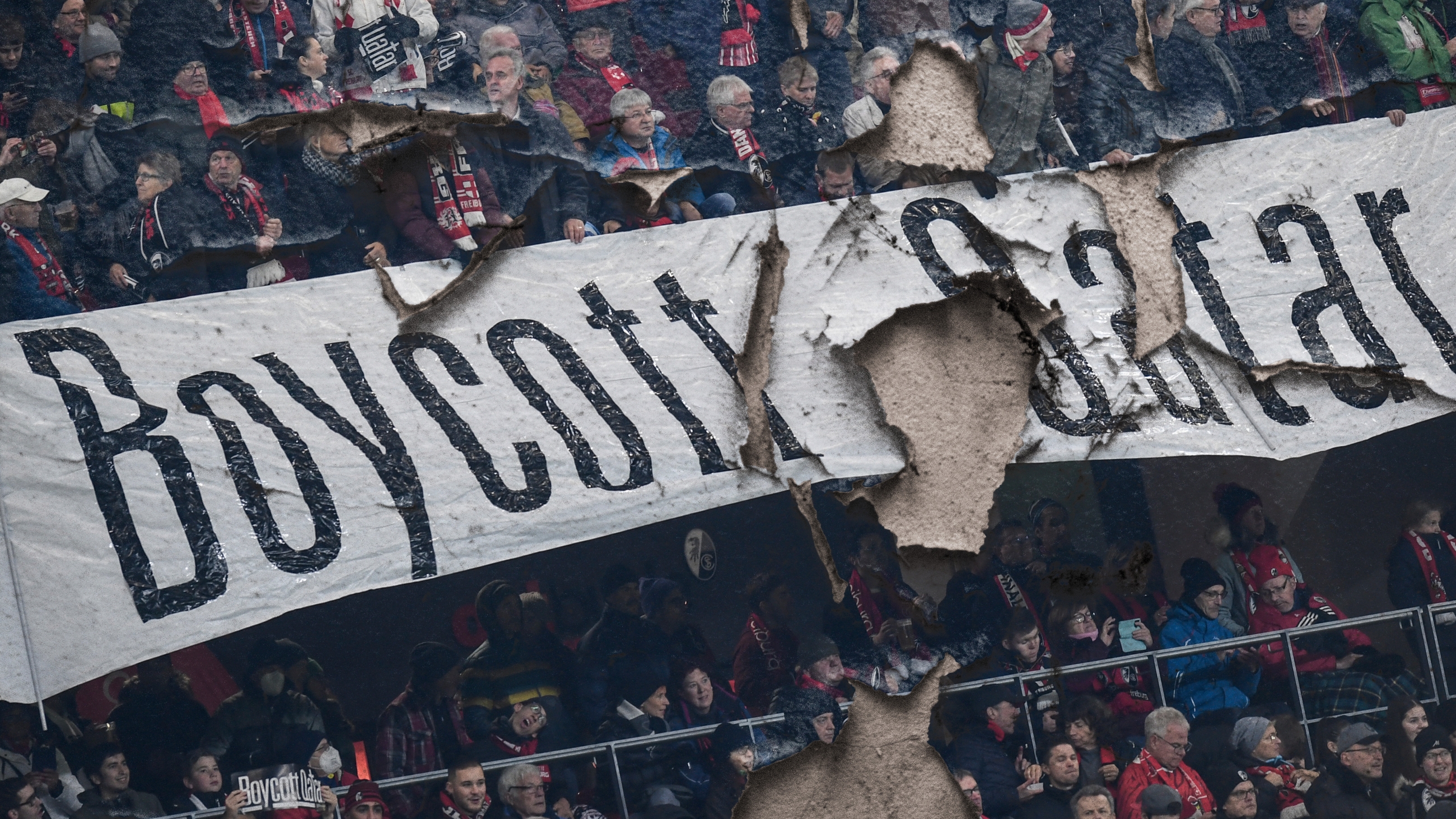
UK's Labour leader Keir Starmer, notoriously cautious, has gone into battle over the upcoming Fifa World Cup in Qatar.
Even if England’s team made it into the final, he said on air in late October, “the human rights record is such that I wouldn’t go and that’ll be the position of the Labour Party”.
Shortly afterwards, the shadow culture secretary, Lucy Powell, announced that no Labour delegation would be going to Qatar. “LGBT England and Wales fans are having to put up with the tournament being played in a country where their sexuality is criminalised,” she said.
This kind of moral stance is unusual for the Labour Party. Starmer recently slammed Prime Minister Rishi Sunak’s decision not to attend COP27 in Egypt as an “absolute failure of leadership”. But by all measures, human rights are in a much worse state in Egypt than in Qatar.
There are an estimated 60,000 political prisoners in Egypt, including the activist Alaa Abd el-Fattah. A British-Egyptian dual citizen, he recently called off a hunger strike and risks dying in prison as have hundreds of other political detainees.
Does Starmer think that climate change is more important than these staggering human rights abuses? His pragmatism when it comes to Egypt does not seem to extend to Qatar.
It’s curious that Starmer should intervene so stridently in a sporting event. Perhaps we can expect the Labour leader to remark next on the upcoming Formula 1 Grand Prix in Abu Dhabi. The United Arab Emirates has a record of imprisoning dissidents, and there is widespread abuse of migrant workers. Like Qatar, the country criminalises homosexuality. But so far, Starmer hasn’t said anything about the Grand Prix.
And then there’s cricket. When England won the final of the 2022 T20 Cricket World Cup in Australia at the weekend, it would have been the perfect time for Starmer to announce that Labour would boycott the Cricket World Cup next year in India. Experts warn of a potential genocide against Muslims there.
Does Starmer think that the lives of Indian workers in Qatar are more valuable than the lives of minority citizens in India? Perhaps Labour is soon to announce its boycott of the 2023 Cricket World Cup.
Vociferously condemned
Selective moral outrage isn’t just coming from the Labour Party, though. Qatar is being widely and vociferously condemned in the sports world and the mainstream press.
Coach Gary Neville has been lambasted for agreeing to work for the Qatari state-owned channel beIN Sports at the World Cup. Former England striker Gary Lineker says he knows secretly gay Premier League footballers and thinks it would be “great if one or two of them came out during the World Cup” to send a message to Qatar.
There are many serious criticisms that can be levelled against Qatar. But the country is subject to an extraordinary campaign which often seems based on ignorance and bigotry
Then there’s England’s team captain, Harry Kane. He intends to wear a "OneLove" rainbow-coloured armband in Qatar showing support for LGBTQ+ rights.
There’s something strange about the coverage of this World Cup. There are many serious criticisms that can be levelled against Qatar. But the country is subject to an extraordinary campaign which often seems based on ignorance and bigotry.
In the British press, only a very small amount of the coverage of Russia in the run-up to its 2018 World Cup was about the football event. By contrast, almost half of the coverage on Qatar has been about the World Cup.
Reporting on Russia’s invasion of Crimea, the bombing of Syria and human rights abuses was relatively disconnected from coverage of the World Cup there. In the one-dimensional, simplistic reporting on Qatar, however, human rights abuses are being closely connected to the World Cup, even when the two topics are not directly related. The result has been the extreme politicisation of the sporting event.
Painting a simplistic caricature of Qatar, moreover, is significant in shaping public opinion about the country. Most people in Europe and America know little about Qatar’s people, history, political system and culture except for what they see in coverage of the World Cup.
'Oriental despotism'
In France, where multiple municipalities are refusing to hold public screenings of World Cup matches in protest at Qatar hosting the event, the magazine Le Canard recently published a racist cartoon depicting Qatari footballers as terrorists, holding the country up as a spectacle of horrifying barbarism in a manner that evokes old ideas of "oriental despotism".
In 2021, the Guardian reported that a staggering 6,500 migrant workers had died since the World Cup was awarded to Qatar, seeming to imply that the deaths were connected to the World Cup.
"The 6,500 figure actually refers to all deaths of migrant workers from Pakistan, Sri Lanka, Nepal, India and Bangladesh, regardless of cause," says Marc Owen Jones, assistant professor of Middle East Studies at Hamad bin Khalifa University, Qatar. “It's not an 'excess' death figure.”
The number of worker deaths actually linked to the World Cup is disputed. While World Cup organisers say that there have been three work-related accidents and 37 deaths from all causes, a report by the UN’s International Labour Organisation says that there were 50 deaths in the construction industry in 2020 and raises questions about the way that deaths are categorised.
The Guardian’s story was tweeted thousands of times and the "6,500" figure was picked up by journalists across Europe, especially in France, often being misinterpreted as suggesting that 6,500 migrants had died on World Cup construction sites. In Britain, the number was cited by a Sky News interviewer, speaking about World Cup-related deaths in a question put to Qatar’s foreign minister. He replied that the figure was untrue.
And at a recent football match between Bayern Munich and Borussia Dortmund, fans held up a flag saying “15,000 deaths for 5,760 minutes of football - shame on you”. The "15,000" figure stems from an Amnesty International report. It refers to the total number of deaths of all non-Qataris in Qatar between 2010 and 2019, not of construction workers on the World Cup, nor even only construction workers.
Reforms
Political geographer Natalie Koch, who has studied the topic in depth, notes that “it is rarely the Qatari government directly exploiting the workers but their fellow citizens who serve as brokers and manage their contracts in Qatar and at home”.
In recent years, reforms have somewhat improved the situation in Qatar. The kafala sponsorship system has been overhauled so that migrants can now change jobs without their employers’ approval. Researcher Crystal Ennis, writing for Middle East Eye, notes that “improvements have taken place to bring regulations into line with international labour standards”.
Qatar is now far ahead of its neighbours in key respects. In 2021, the government introduced a non-discriminatory minimum wage law. By the end of the year, it had reportedly paid $165m in compensation to 36,000 workers.
In a new report, the International Labour Organisation highlights improved working and living conditions for workers because of reforms introduced by the Qatari government. It adds, however, that there were still immense challenges in implementing these reforms. The reality is that terrible abuse and appalling living conditions remain a feature of life for many migrants.
The overarching problem, Ennis argues, is the exploitation of migrant workers in global labour market structures. It’s not just the Gulf - some European countries also have serious issues with the abuse of migrant workers, but they receive little attention in the mainstream British media.
A global effort is needed to encourage safe and regular migration. Both Human Rights Watch and Amnesty International warn against an international boycott of the World Cup, arguing that it won’t drive positive change. Strikingly, though, only seven of the qualifying football federations endorsed a campaign calling on Fifa to create a $440m compensation fund for migrant workers. This was a more practical but less sensational demand.
LGBTQ+ rights
Of course, there are some irreconcilable differences in values between the British public and Qatar. One issue which has provoked particular outrage is LGBTQ+ rights - 62 percent of British people think Qatar’s position on this issue alone should have barred it from hosting the World Cup.
It is of course vital to draw attention to horrifying reports of the arbitrary arrest and abuse of LGBTQ+ people in Qatar. Human Rights Watch recently documented "six cases of severe and repeated beatings and five cases of sexual harassment in police custody between 2019 and 2022", although Qatar strongly disputes the report’s assertions.
But in terms of the criminalisation of homosexuality, there’s nothing exceptional about Qatar’s stance. In most Commonwealth countries homosexuality is illegal, and many of these are Christian, not Muslim, countries.
This raises the question of whether it’s acceptable to travel to or engage with countries around the world such as Saint Lucia, Singapore and Nigeria. If it is, why is Qatar being singled out?
Nor does this issue pit Europe against the rest of the world. Around 100 towns and regions across Poland have declared themselves free of “LGBT ideology”. In Italy, the recently elected government strongly opposes same-sex marriage and its president rails against the “LGBT lobby”.
In Qatar, sexuality is understood in terms of actions rather than identity. Under Qatari law, sexual relations outside of marriage and sodomy are both crimes, whether they’re between a man and woman or a same-sex couple. So too are “immoral actions”, a term which is undefined.
It’s noteworthy that the US Department of State report in 2021, like reports in previous years, doesn’t reference any actual prosecutions for same-sex sexual behaviour. However, it must be said that the reporting of incidents is limited due to the Qatari LGBTQ+ community not being able to be open about their identities
Qatar’s approach reflects the fact that its society is conservative. Public displays of affection between members of the same sex are forbidden, and any public display of affection can lead to arrest, including between a man and a woman. Holding hands, by contrast, is legal - including for two men and two women.
In the run-up to the World Cup, the emir of Qatar has maintained that LGBTQ+ fans are welcome but must “respect our culture”.
Complexity
It’s worthy of comment that the world of football has never been renowned for its celebration of LGBTQ+ identities either. In May this year, Jake Daniels became the first male British footballer in over 30 years to come out as gay.
No country should be treated like it’s beyond criticism. And any country that hosts a major sporting event must expect to face scrutiny over its human rights record.
Any country that hosts a major sporting event must expect to face scrutiny over its human rights record
But the orientalist depiction of Qatar as a land of exceptional barbarism functions as a form of virtue signalling, a self-congratulatory but incoherent show of moral superiority.
Qatar is a young country - it was only founded in 1971 and it has developed dramatically in the last few decades. Last year, the nation held its first elections for the Shura Council, the state’s legislative body. Qatar is a fast-changing country, and that’s partly because of hosting the World Cup.
This could have been a chance for the world to learn more about Qatar. Instead, the opposite is happening.
Taking a moral stance is important, but can only be helpful if it’s consistent and combined with a genuine attempt to understand the Other in all its complexity.
The views expressed in this article belong to the authors and do not necessarily reflect the editorial policy of Middle East Eye.
This article is available in French on Middle East Eye French edition.
Middle East Eye propose une couverture et une analyse indépendantes et incomparables du Moyen-Orient, de l’Afrique du Nord et d’autres régions du monde. Pour en savoir plus sur la reprise de ce contenu et les frais qui s’appliquent, veuillez remplir ce formulaire [en anglais]. Pour en savoir plus sur MEE, cliquez ici [en anglais].


